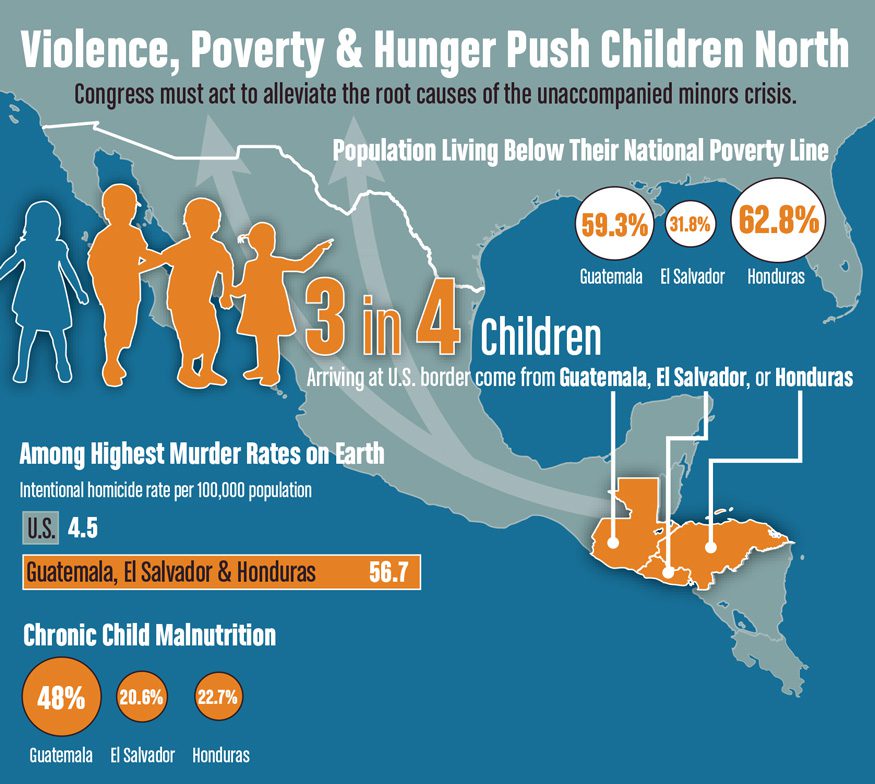By Marlysa Gamblin and Jordan Teague
In recent years, Bread for the World’s work has led us to look at immigration, especially undocumented immigration, as a hunger issue — both here in the United States and in low-income home countries around the world.
In our new background paper, From Hunger to Hunger: Undocumented Immigrants Face Hunger on Both Sides of the Border, we explain that many undocumented immigrants flee from hunger in their home countries due to extreme poverty only to face hunger once they arrive in the United States. Unfortunately, many remain at high risk of hunger and poverty even after years of living and working here.
As a Christian organization, Bread for the World is working to end hunger by 2030, a goal adopted by the United States and 194 other countries in 2015. To achieve this goal, we must understand what makes undocumented immigration a hunger issue and how improved U.S. policies could help. We must also develop longer-term solutions by responding to the root causes of undocumented immigration.
Our nation has the unique opportunity to practice love, the most important commandment of all (Mark 12) in the way we respond to undocumented immigration. To learn more about the biblical basis for our work on undocumented immigration, please read “The Bible and Immigration Reform.”
Did You Know?
- The proportion of immigrants to the United States who are fleeing their home countries rather than seeking more opportunities is increasing. Many immigrants are pushed from their home countries by factors beyond their control, such as extreme poverty, hunger, violence, and unsafe, insecure living conditions.
- Since 2014, there have been more undocumented immigrants from Central America apprehended at the southern U.S. border than from Mexico. In fact, in 2016 more than 90 percent of the families apprehended came from three countries — El Salvador, Guatemala, and Honduras. These three countries are among the poorest in the world, with extremely high levels of hunger and malnutrition.
- Even immigrants from stable countries such as Mexico face problems that “push” them out of their home countries. While Mexico’s economy has grown, most of the wealth has not gone to the poorest; about half of Mexico’s population lives below the poverty line. The poorest 20 percent of people in Mexico have only 5 percent of the national income. They also live in “food poverty,” meaning that according to government statistics, their income is not enough to meet even basic food needs.
Did You Know?
- Deportation of undocumented immigrants puts 4.5 million U.S.-born children at risk of falling into deeper hunger, both immediately as children and later as adults. Removing a parent also removes his or her financial support from a struggling household. Children who have a parent in detention are three times as likely to develop mental health problems, speech delays, and troubled academic records, all factors that increase a child’s likelihood of remaining food insecure as an adult.
- Contrary to popular belief, undocumented immigrants are not eligible to receive safety net program benefits — this despite the $11.6 billion in taxes that undocumented immigrants contribute each year, and the fact that they are three times as likely as the “average” American to live below the poverty line.
- Mass deportations would reduce the nation’s GDP by $4.7 trillion over the next 10 years. On the other hand, comprehensive immigration reform that includes a pathway to citizenship could significantly increase the U.S. tax base and tax revenues.
In the effort to end hunger by 2030, we cannot examine policies in a vacuum. Bread for the World calls for comprehensive immigration policy that takes into account hunger and poverty as root causes of undocumented immigration and that provides better opportunities for immigrants living in hunger and poverty in the United States. We urge the U.S. government to strive for lasting solutions to hunger and poverty on both sides of the border as part of any immigration policy.
For more information, read Bread for the World Institute’s new background paper, From Hunger to Hunger: Undocumented Immigrants Face Hunger on Both Sides of the Border.
Marlysa Gamblin is a domestic advisor for policy and programs, specific populations at Bread for the World Institute. Jordan Teague is an international policy analyst for food security and nutrition at Bread for the World Institute.



